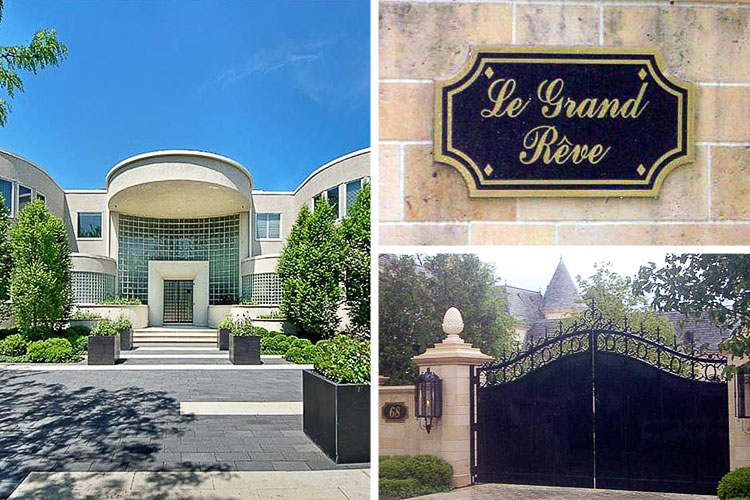The company that failed to sell Michael Jordan’s Highland Park house at a highly publicized December auction was already being sued by its only other Chicago-area client when the company made a deal with Jordan.
The other clients, sellers of a palatial Winnetka mansion known as Le Grand Reve, claim in their suit, which was filed last June, that Concierge Auctions exaggerated its track record of selling megapriced homes at auction. They also claim that they were made to look financially desperate because Concierge promoted the auction as a no-reserve event, where the winning bid—no matter how low—would get the property, which had previously been priced at $32 million.
The October 2011 auction ended without a sale. In their lawsuit, Deborah and Sherwin Jarol say they never intended to sell without a reserve but were pressured to do so by the auction house.
The Jarols declined to comment for this story, as did their attorney on the suit, Joel Schneck of Goldberg & Rimberg in New York. Concierge has not yet responded to requests for comment.
Robert Wolf, the attorney for Concierge Auctionsat Moses & Singer in New York, dismissed the Jarols’ claims as “baseless and entirely without merit” in an email to me Tuesday: “The Jarols’ claims are completely unrelated and irrelevant to the results of the Highland Park auction,” he wrote.
The lawsuit, jointly filed by a competitor of Concierge and the Jarols, makes extensive allegations that Concierge uses fake bidders, labels homes as sold at auction that never did, and other moves that would make the company appear more successful at auctioning mega-homes than is true. Debroah Jarol even claims that on the day of the auction, she sat upstairs listening and heard the auctioneer call out higher and higher numbers as if the bids were rising, when bids weren’t being made.
It’s a lawsuit on which the judge hasn’t yet announced a decision, and of course people can claim anything they want to claim in a lawsuit. Wolf notes that “we have filed a motion to dismiss the case and are confident it will be granted.”
What makes it news in Chicago is that the lawsuit was already several months in play in October, when superstar Michael Jordan agreed to have Concierge Auctions attempt to sell his house—and because the eventual failure to sell his house plays out like other examples mentioned in the lawsuit.
Katherine Malkin, the Baird and Warner agent who represented Jordan’s house, confirmed to me Monday that she knew about the lawsuit before signing with Concierge. “That was in the research that was done by our group,” she told me. “We were comfortable with Concierge and thought they would do a good job for us.”
The Wall Street Journal and the Today show both did advance stories on the auction—along with virtually every Chicago news outlet. Thus the name of the auction house became linked with basketball’s biggest-ever star. The Wall Street Journal quoted His Airness saying, “some of the best things in the world are sold at auction, and I’ve seen that this is the beginning of a trend for selling unique, one-of-a-kind homes.” As I noted in a pre-auction story, a successful auction of Jordan’s house would have been the first in the Chicago area to demonstrate the viability of high-end home auctions.
After the auction failed, most articles included a statement from Jordan’s spokeswoman, Estee Portnoy, complimenting the auction house: “Concierge gave great exposure to the property,” she said. (Wolf sent that statement along in his Tuesday e-mail, as well.)
Jordan’s auction was originally publicized as a no-minimum auction to be held in November, but sometime after it was postponed to December, a $13 million minimum was instituted. This looks similar to the Jarols’ claim that they were pressured to go no-minimum and then only after they balked was a $15 million minimum put in at the last minute. The game plan that the lawsuit lays out is this: Concierge allegedly uses the publicity about a “no minimum” auction to generate enough interest in snapping up a deeply-discounted super-lavish home that buyers line up to get it before it goes to auction. The homeowners pay more to Concierge if it sells at auction than if it sells earlier, so there’s an incentive for them to participate in the “no minimum” publicity, the lawsuit suggests.
In 2012, Concierge was signed to auction a property for another, smaller-gauge celebrity, NASCAR driver Joe Nemechek. His 139-acre North Carolina horse ranch was to be auctioned with no minimum, the Wall Street Journal and others reported. A source for this article, Valaria DeVine, CEO of Grand Estates Auction Co.—the Jarols’ partner in the lawsuit—urged me to look for results of that auction. I can find nothing online reporting the sale, although there are dozens of pre-auction articles naming both Nemechek and Concierge. Nemechek’s attorney in Charlotte, John Northey, said that neither he nor Nemechek would comment on the auction. I don’t know whether the home sold.
Jordan put his home back on the conventional real estate market two days after the December auction failed; his asking price is now $16 million; that’s 55 percent of his original $29 million asking price. In the lawsuit, the Jarols say that on the day after their auction failed, Concierge “forwarded a purported offer” for $8.5 million, which would have netted the sellers about $7.65 million after fees to the auction house. They later put the house back on the market, asking $18.9 million.




